Celebrated for their vibrant yellow hue and cherished place in our fruit bowls, bananas are not only a beloved snack and culinary ingredient but also a treasure trove of health benefits. These bananas benefits extend far beyond their delectable taste and unparalleled convenience.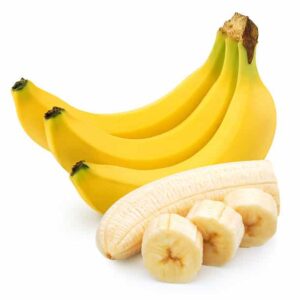
Within their sunny exteriors lies a nutritional powerhouse, teeming with essential vitamins, minerals, and health-promoting compounds. As we embark on this exploration, we will delve deep into the numerous advantages of consuming bananas, uncovering a wealth of scientific research that substantiates their role in promoting overall well-being.
In this article, we’ll unravel the nutritional marvel that is the banana. We’ll dissect its vitamin and mineral content, emphasizing its role as a source of vitamin C for a robust immune system and vitamin B6 for optimal brain function. We’ll also highlight its potassium content, a boon for heart health, and its dietary fiber, which keeps our digestive system in top form.
Rich Source of Vitamins and Minerals
Bananas are a rich source of vitamins and minerals, making them an ideal addition to a balanced diet. One medium-sized banana contains approximately 14% of the daily recommended intake of vitamin C, which supports a healthy immune system and skin. Moreover, bananas are a great source of vitamin B6, providing around 22% of the daily recommended amount. Vitamin B6 plays a crucial role in brain development and function.
Additionally, bananas are a notable source of essential minerals such as potassium. One medium-sized banana contains approximately 12% of the recommended daily intake of potassium. This mineral is vital for maintaining proper heart function, regulating blood pressure, and supporting muscle contractions.
Fiber for Digestive Health
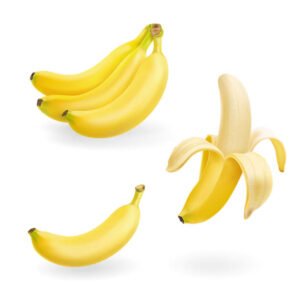 Bananas are an excellent source of dietary fiber, which is essential for a healthy digestive system. A medium-sized banana contains approximately 3 grams of dietary fiber, aiding in regular bowel movements and preventing constipation. Moreover, the fiber in bananas promotes a feeling of fullness, making them a satisfying and nutritious snack.
Bananas are an excellent source of dietary fiber, which is essential for a healthy digestive system. A medium-sized banana contains approximately 3 grams of dietary fiber, aiding in regular bowel movements and preventing constipation. Moreover, the fiber in bananas promotes a feeling of fullness, making them a satisfying and nutritious snack.
Additionally, the specific type of fiber found in bananas, known as pectin, contributes to their digestive benefits. Pectin acts as a prebiotic, fostering the growth of beneficial gut bacteria. This not only enhances overall gut health but also supports the body’s ability to absorb essential nutrients. Furthermore, bananas are easily digestible, making them an ideal choice for individuals with sensitive stomachs or digestive concerns. The combination of soluble and insoluble fiber in bananas underscores their role in maintaining a well-balanced and efficient digestive system.
Skin Health
The benefits of bananas extend to your skin as well. The vitamin C in bananas promotes collagen production, which is essential for maintaining skin elasticity and preventing signs of aging. Additionally, the antioxidants in bananas help combat free radicals that can cause skin damage, keeping your skin looking youthful and healthy.
Bananas also contain vitamin A, which plays a crucial role in repairing damaged skin and promoting the growth of new, healthy cells. This vitamin, combined with the high levels of water content in bananas, helps hydrate the skin, leaving it soft and supple. Furthermore, the presence of B vitamins in bananas, such as B6, aids in reducing inflammation and redness, contributing to an overall improved complexion.
Natural Stress Reliever
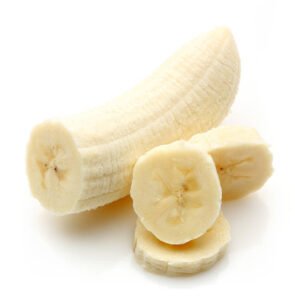 Stress is a common part of modern life, and finding natural ways to manage it is crucial for our well-being. Bananas contain a significant amount of magnesium, a mineral known to relax muscles and calm the nervous system. This can help reduce stress and promote a sense of relaxation and tranquility.
Stress is a common part of modern life, and finding natural ways to manage it is crucial for our well-being. Bananas contain a significant amount of magnesium, a mineral known to relax muscles and calm the nervous system. This can help reduce stress and promote a sense of relaxation and tranquility.
Additionally, bananas are rich in vitamin B6, which plays a key role in the synthesis of neurotransmitters like serotonin and dopamine. These brain chemicals contribute to mood regulation, and having sufficient levels of vitamin B6 can positively impact mental well-being. The combination of magnesium and vitamin B6 in bananas makes them a natural stress reliever with the added benefit of supporting a balanced emotional state.
Supports Eye Health
Bananas are rich in vitamin A, which plays a vital role in maintaining good vision and eye health. Vitamin A helps protect the surface of the eye and is essential for night vision. Consuming bananas regularly can contribute to preserving your eyesight as you age.
Furthermore, bananas contain significant amounts of lutein and zeaxanthin, two essential antioxidants that are crucial for eye health. These compounds are known to accumulate in the retina and help protect against harmful high-energy light waves like ultraviolet rays
Boosts Immunity
A healthy immune system is essential for warding off illnesses, and bananas can be a valuable asset in this regard. The combination of vitamins and antioxidants in bananas helps strengthen your immune system, making it better equipped to fight off infections and illnesses.
In addition to their rich vitamin and antioxidant content, bananas offer a unique advantage in boosting immunity due to their high levels of vitamin B6. This essential nutrient plays a crucial role in the production of antibodies, enhancing the body’s ability to combat pathogens effectively.
Furthermore, the presence of prebiotics in bananas promotes a healthy gut microbiome, fostering a conducive environment for the development of beneficial bacteria that further contribute to immune system resilience.
Natural Prebiotic
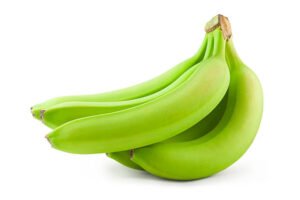 Bananas contain dietary fibers that act as prebiotics, providing nourishment for the beneficial bacteria in your gut. A healthy gut microbiome is linked to improved digestion, a stronger immune system, and better overall health.
Bananas contain dietary fibers that act as prebiotics, providing nourishment for the beneficial bacteria in your gut. A healthy gut microbiome is linked to improved digestion, a stronger immune system, and better overall health.
Furthermore, bananas stand out among natural prebiotics due to their rich content of resistant starch, a type of carbohydrate that escapes digestion in the small intestine and reaches the colon intact. This unique characteristic fuels the growth of beneficial bacteria, such as Bifidobacteria, promoting a diverse and robust gut microbiota.
Additionally, the high potassium content in bananas contributes to a well-balanced gut environment by supporting electrolyte balance and enhancing the absorption of essential nutrients. In essence, the exceptional combination of dietary fibers, resistant starch, and essential nutrients in bananas makes them a standout natural prebiotic, fostering optimal gut health and overall well-being.
Potassium for Heart Health
Potassium is a vital mineral that plays a pivotal role in maintaining heart health and regulating blood pressure. Bananas are renowned for their high potassium content. Consuming a banana can provide about 9% of the daily recommended potassium intake. Several studies have linked increased potassium consumption to reduced blood pressure and a lower risk of stroke.
Furthermore, the potassium in bananas is accompanied by other essential nutrients such as vitamin C, vitamin B6, and dietary fiber, which collectively contribute to overall heart health. The unique combination of these nutrients in bananas not only supports cardiovascular function but also aids in maintaining optimal cholesterol levels.
Natural Energy Boost
Bananas are an excellent source of carbohydrates, which are the body’s primary energy source. The natural sugars found in bananas, such as glucose, fructose, and sucrose, provide a quick energy boost without the need for processed sugars or caffeine. Athletes often consume bananas before or after workouts to replenish their energy levels and prevent muscle cramps.
Furthermore, bananas are rich in essential vitamins and minerals that contribute to a sustained and balanced energy release. Potassium, a key electrolyte present in bananas, plays a crucial role in maintaining proper muscle function and hydration. This makes bananas an ideal choice for promoting endurance and reducing the risk of fatigue during physical activities.
Additionally, the combination of fiber and natural sugars in bananas ensures a steady release of energy, providing a lasting and wholesome vitality. Incorporating bananas into your diet not only offers a convenient and portable energy boost but also delivers a spectrum of nutrients for overall well-being.
Antioxidants for Cellular Health
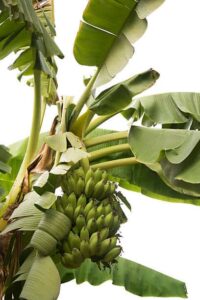 Bananas contain antioxidants, such as dopamine and catechins, which help protect cells from damage caused by free radicals. These antioxidants may play a role in reducing the risk of chronic diseases and promoting overall health.
Bananas contain antioxidants, such as dopamine and catechins, which help protect cells from damage caused by free radicals. These antioxidants may play a role in reducing the risk of chronic diseases and promoting overall health.
Furthermore, bananas stand out for their high levels of vitamin C, a potent antioxidant that supports the immune system and aids in collagen formation for skin health. The combination of dopamine, catechins, and vitamin C in bananas makes them a versatile fruit in providing robust protection against oxidative stress, bolstering cellular resilience, and contributing to a well-rounded approach to maintaining optimal cellular health.
Mood Enhancement
Bananas are a natural mood enhancer due to their content of tryptophan, an amino acid that the body converts into serotonin. Serotonin is a neurotransmitter that contributes to feelings of happiness and well-being. Consuming bananas can help regulate mood and reduce the risk of depression and anxiety.
In addition to their serotonin-boosting properties, bananas also contain vitamin B6, a crucial nutrient in the synthesis of neurotransmitters, including serotonin. The combination of tryptophan and vitamin B6 in bananas enhances the body’s ability to produce and regulate serotonin levels, promoting a sustained sense of well-being.
Supports Healthy Weight Management
Bananas can also be a valuable ally in your weight management journey. Their high fiber content helps control appetite by promoting a feeling of fullness, which can prevent overeating. Additionally, the natural sugars in bananas provide a sweet fix without resorting to processed snacks and desserts that are often loaded with added sugars and unhealthy fats.
Furthermore, bananas are a low-calorie and nutrient-dense food, making them an ideal choice for those aiming to shed excess pounds. Their unique combination of vitamins, minerals, and antioxidants supports overall health while contributing to a well-rounded weight management plan. The potassium content in bananas also plays a crucial role in regulating fluid balance, potentially reducing water retention and bloating, enhancing the effectiveness of your weight loss efforts.
Aids in Digestive Health
Bananas are gentle on the stomach and can help alleviate digestive issues. Whether you’re dealing with indigestion or an upset stomach, the soothing qualities of bananas can provide relief. They are particularly beneficial for individuals with gastritis or acid reflux, as the natural compounds in bananas help reduce stomach acidity.
Furthermore, bananas contain soluble fiber, such as pectin, which promotes healthy digestion by absorbing water and forming a gel-like substance in the intestines. This process not only helps regulate bowel movements but also contributes to a smoother passage of food through the digestive tract. Additionally, the high potassium content in bananas supports proper muscle contractions, including those in the digestive system, aiding in the overall functionality of the gastrointestinal tract.
Versatile Culinary Ingredient
Bananas are not only great for snacking but also a versatile culinary ingredient. They can be incorporated into various recipes, such as smoothies, oatmeal, pancakes, and baked goods. Adding bananas to your cooking not only enhances the flavor but also boosts the nutritional content of your meals.
The nutritional value of bananas per 100 grams:
- Calories: Approximately 89 calories
- Carbohydrates: Approximately 22.8 grams
- Sugars: Approximately 12.2 grams
- Dietary Fiber: Approximately 2.6 grams
- Protein: Approximately 1.1 grams
- Fat: Approximately 0.3 grams
- Vitamin C: Approximately 8.7 milligrams (15% of the Daily Recommended Intake)
- Vitamin B6 (Pyridoxine): Approximately 0.4 milligrams (22% of the Daily Recommended Intake)
- Vitamin A: Approximately 64 International Units (1% of the Daily Recommended Intake)
- Potassium: Approximately 358 milligrams (10% of the Daily Recommended Intake)
- Magnesium: Approximately 27 milligrams (8% of the Daily Recommended Intake)
Bananas are low in calories and fat while being a good source of essential nutrients. They are particularly notable for their high potassium content, which is important for heart health and regulating blood pressure. Additionally, they provide a decent amount of vitamin C, vitamin B6, and dietary fiber, making them a nutritious choice for maintaining overall health.
Conclusion
Incorporating bananas into your daily diet can provide a wide array of health benefits. They offer essential vitamins, minerals, and fiber that support digestion, heart health, and overall well-being. With their natural sweetness and convenience, bananas make for a delicious and nutritious snack for people of all ages. So, the next time you reach for a snack, consider grabbing a banana to reap the many scientifically-supported benefits it offers.
 If you’re on the hunt for the perfect banana bread recipe, look no further. Renowned chef and culinary expert Jamie Oliver brings you a mouthwatering banana bread recipe that’s bound to become a household favorite. Bursting with the natural sweetness of ripe bananas, this recipe transforms ordinary ingredients into a delightful, moist, and flavorful treat that’s perfect for breakfast, brunch, or a delightful afternoon snack.
If you’re on the hunt for the perfect banana bread recipe, look no further. Renowned chef and culinary expert Jamie Oliver brings you a mouthwatering banana bread recipe that’s bound to become a household favorite. Bursting with the natural sweetness of ripe bananas, this recipe transforms ordinary ingredients into a delightful, moist, and flavorful treat that’s perfect for breakfast, brunch, or a delightful afternoon snack.
Contraindications when consuming bananas
Allergies:
While rare, some individuals may be allergic to bananas. Allergic reactions can range from mild symptoms like itching and swelling to severe reactions such as anaphylaxis. If you suspect an allergy, consult with a healthcare professional.
Weight Management:
Although bananas can be part of a healthy diet, overconsumption can contribute to weight gain due to their calorie and sugar content. It’s important to consume them in moderation as part of a balanced diet.
Diabetes:
People with diabetes should be mindful of their banana consumption due to their natural sugar content. It’s advisable to consult with a healthcare provider or dietitian to incorporate bananas into a diabetic diet plan.
Gastrointestinal Issues:
In some cases, bananas can be constipating, particularly if consumed excessively. Conversely, they can also help alleviate diarrhea due to their pectin content. People with gastrointestinal conditions should monitor their banana intake accordingly.
Potassium Sensitivity:
While potassium is essential for most people, individuals with certain medical conditions, such as kidney problems, may need to limit their potassium intake. Consult a healthcare professional for personalized advice.
Migraine:
Bananas contain tyramine, a compound that can trigger migraines in some individuals. If you’re prone to migraines, monitor your diet and note any potential triggers, including bananas.
Medication Interactions:
Bananas can interact with certain medications. For example, they may affect potassium levels when combined with medications like potassium-sparing diuretics. If you’re on medication, consult your healthcare provider about any dietary restrictions.
It’s essential to remember that bananas are generally safe and nutritious for most people when consumed as part of a balanced diet. However, if you have specific health concerns or conditions, it’s advisable to seek guidance from a healthcare professional or registered dietitian to ensure that banana consumption aligns with your individual dietary needs and health goals.
Fascinating Facts About Bananas
Slippery Science:
The reason banana peels are slippery is due to a substance called “bananin.” Bananin is a polysaccharide that, when released from the peel, creates a slimy surface. This slippery quality has even inspired slapstick comedy routines involving people comically tumbling on banana peels.
Banana Etymology Mystery:
The word “banana” has uncertain origins. Some believe it comes from the Arabic word “banan,” meaning finger, while others suggest it has West African roots. The linguistic journey of the word itself is as mysterious as the fruit is delicious.
Banana Art Craze:
Believe it or not, there’s a thriving community of banana artists. Using the peel as their canvas, these creatives carve intricate designs or use the natural oxidation process to create temporary masterpieces. Banana art competitions have even emerged to showcase the most imaginative designs.
Banana Equivalent Dose:
Bananas have their own unit of radiation measurement known as the “banana equivalent dose.” This quirky concept quantifies the amount of radiation exposure one receives from eating a banana. It’s a testament to the fruit’s low levels of naturally occurring radioactive potassium-40.
Banana Spider Surprise:
In the tropics, particularly in Australia, a banana bunch might harbor a surprise – the notorious banana spider. This large and colorful arachnid often hides among the bananas, creating unexpected encounters for unwary fruit enthusiasts.
Banana Peel Tea:
In some cultures, dried banana peels are used to make tea. This unusual beverage is believed to have sleep-inducing properties, and enthusiasts claim it helps promote relaxation and alleviate insomnia. It’s an unconventional way to make use of every part of the banana.
Banana DNA Mystery Solved:
While bananas share about 50% of their DNA with humans, one specific gene in bananas caught scientists by surprise. The “RGA2” gene, responsible for disease resistance, has a counterpart in humans. This genetic connection adds a strange twist to the evolutionary relationship between humans and bananas.
Banana Club:
There’s an exclusive club called the “Banana Club Museum” in California, dedicated solely to banana memorabilia. From banana-themed trinkets to art and artifacts, this peculiar museum is a haven for those who can’t get enough of the potassium-packed fruit.
Banana Anatomy Anomaly:
Inside every banana, there’s an unexpected feature – a trio of dark strings known as phloem bundles. These tiny, nearly invisible threads run along the length of the banana and are remnants of the fruit’s flower structure. They’re harmless but serve as a quirky reminder of the banana’s botanical origins.
Banana Ice Cream Roots:
The popular trend of making “banana ice cream” has roots in the unexpected creaminess of frozen bananas. Simply freezing ripe bananas and blending them creates a smooth, ice cream-like consistency. It’s a dairy-free delight and a testament to the banana’s versatility.
Banana Language Barrier:
In American Sign Language (ASL), the sign for “banana” is hilariously similar to the act of peeling and eating a banana. This unique linguistic quirk adds a touch of humor to ASL conversations involving the beloved fruit.
Banana Stress Therapy:
The scent of ripe bananas is believed to have stress-relieving properties. Aromatherapy enthusiasts claim that inhaling the fragrance of bananas can help reduce stress and increase relaxation. It’s an aromatic escape that adds a sensory dimension to banana appreciation.
Banana Shredding Records:
Believe it or not, there’s a competitive sport called “banana shredding.” Participants attempt to peel and eat as many bananas as possible within a specified time. It’s a quirky challenge that combines speed, dexterity, and a love for this potassium-rich fruit.
Banana Beer Brews:
In some regions, particularly in East Africa, bananas are used to brew beer. Known as “banana beer” or “ajon,” this traditional beverage involves fermenting mashed bananas to create a mildly alcoholic drink. It’s an unusual yet culturally significant use of this tropical fruit.
Banana Island Bliss:
In the Philippines, there’s a unique island called Camiguin, often referred to as the “Island of Fire.” What makes it stand out? It’s home to more volcanoes than towns and boasts the intriguing title of “the island with more volcanoes than bananas.”
Banana Sticker Secrets:
Ever noticed those stickers on bananas? They’re not just for identification. The numbers on the stickers actually convey valuable information. The PLU (Price Look-Up) code reveals how the banana was grown – whether conventionally, organically, or genetically modified.
To explore more plants, please visit our page about plants
References
- Dreher, M. L., & Davenport, A. J. (2013). Hass Avocado Composition and Potential Health Effects. Critical Reviews in Food Science and Nutrition, 53(7), 738–750.
- Fulgoni, V. L., Dreher, M., & Davenport, A. J. (2013). Avocado consumption is associated with better diet quality and nutrient intake, and lower metabolic syndrome risk in US adults: results from the National Health and Nutrition Examination Survey (NHANES) 2001–2008. Nutrition Journal, 12(1), 1-8.
- Ojo, O., Ojo, A. B., Adebowale, F., Wang, X.-H. (2019). The Effect of Dietary Glycaemic Index on Glycaemia in Patients with Type 2 Diabetes: A Systematic Review and Meta-Analysis of Randomized Controlled Trials. Nutrients, 11(6), 1395.
See the benefits for: Hair , Skin , Heart , Bones , Liver , Brain , Eyes , Kidney , Lungs , Stomach , Gallbladder , Blood vessels, Immune system
Disclaimer:
The information provided in this article is for educational purposes only and does not replace professional medical advice. Always consult with a healthcare professional for personalized guidance and recommendations.
